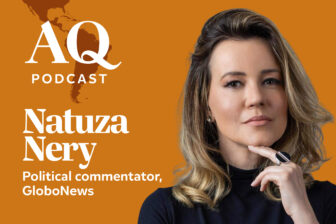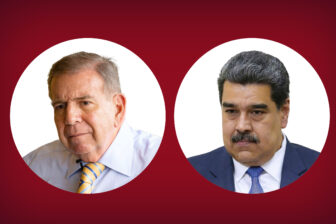SÃO PAULO — Over recent days, political debates in Brazil briefly seemed to have returned to the heyday of polarization before the 2022 presidential elections. President Luiz Inácio Lula da Silva’s decision to compare, in off-the-cuff remarks during a trip to Africa, Israel’s war against Hamas to the Holocaust set off heated debates between his supporters and those who criticized the president. Less than a week later, ex-president Jair Bolsonaro, with a fiery speech to thousands of supporters in São Paulo, briefly led to people mutually accusing each other on X of lying about the exact number of people who attended the former president’s rally. Emblematically, there is reason to believe that Lula’s comments about Israel helped boost attendance numbers at the rally.
Little suggests polarization has gone away since the highly contentious election cycle in October 2022. Polarization in Brazil seems to have “calcified“: A poll in December indicated that more than 90% of people who had voted for either Lula or Bolsonaro did not regret their choice, even though Bolsonaro had been convicted for abuse of power and barred from holding office until 2030 by then.
And yet, while both Lula and Bolsonaro possess an unrivaled capacity to mobilize their respective supporters and single-handedly produce confrontations on social media, a broader analysis reveals that the intensity of polarization in Brazil, in many ways, seems to have declined considerably over the past year. Perhaps the most relevant example is the cordial and professional relationship between the two most powerful politicians in the country: the left-wing president Lula da Silva and right-wing São Paulo governor Tarcísio de Freitas, a Bolsonaro protégé who may challenge Lula in 2026.
As early as February last year, with memories still fresh from the violent insurrection of pro-Bolsonaro supporters that shook Brazil a month earlier, Lula and Freitas appeared together in São Sebastião, a coastal city where mudslides had killed 65 people, in a signal both were willing to leave behind the toxicity that had shaped relations between left and right during the years prior. Most recently, when Lula and Freitas participated in an event to announce the construction of an infrastructure project in São Paulo, the two treated each other with ostensible friendliness. The inaugural ceremony, Lula said, showed that it was necessary to “restore normality” and respect political differences before turning to the governor to say that he would provide him with “whatever is necessary,” leading to applause not only from Freitas but also from Fernando Haddad, current Minister of Finance who had lost the race for São Paulo governor in the runoff.
Skeptics may brush off such rhetoric as little more than theatrics. After all, Lula, particularly when speaking off-the-cuff, is prone to engage in controversial rhetoric than fan the flames of polarization, and the governor of São Paulo joined Jair Bolsonaro during his recent rally, and on X celebrated the former president’s legacy. Yet it is equally worth noticing that Freitas and Lula largely refrain from attacking each other on social media and offline. Brazilian politics seems to have calmed down considerably compared to the years leading up to the 2022 presidential elections. As AQ’s editor-in-chief Brian Winter put it late last year, “Brazilian newspapers have been dreadfully boring lately. This is good news for Brazil.” With personal attacks between leading political figures becoming less frequent, there is more space for relatively wonkish debates about the fiscal deficit, tax reform, and the energy transition.
In this context, it may be a good sign that some of the most controversial debates over the past years were centered around foreign policy. This topic may satisfy the existing public demand for polarization, but the stakes are relatively low, given that Brazil is a bystander to most geopolitical hotspots such as Ukraine and Gaza, and given that the topics rank low on people’s preference list. Putting it differently, foreign policy may be the ideal topic for internet users to let off steam, but even the fiercest disagreements on the subject only rarely rock the boat in Brasília.
In addition, several of Brazil’s so-called “conflict entrepreneurs” (to use terminology coined by political scientist Barbara F. Walters), who thrive on extreme polarization—such as far-right commentator Rodrigo Constantino—seem to have lost some of their agenda-setting capacity, potentially because Brazilians do not seem to be in the mood for non-stop mudslinging in politics at this point. On the other side of the ideological spectrum, polarizing figures such as congressman André Janones, who gained significant visibility during the presidential elections, have lost much of his visibility. Also, while hard to quantify, one cannot help but notice that the pro-Bolsonaro groups on Telegram and other platforms have not regained the verve they lost when the former president traveled to Florida in late 2022.
Finally, while polarization is likely to be a reality in Brazilian politics for years to come, it does not threaten political stability as it did little more than a year ago. When the electoral court decided to bar Bolsonaro from holding office for eight years, few protests erupted, and politics went on as usual. Even if Bolsonaro were to be detained in the coming weeks or months—an increasingly likely scenario—widespread chaos is unlikely.
While it is too early to celebrate, the decidedly more cordial tone of Brazil’s political debate—both in Brasilía and on social media—is unambiguously good news for the world’s fifth-largest democracy. While some polarization is necessary for any democracy, too much polarization can be destructive and even threaten political stability. For now, however, Brazil seems to be moving into calmer waters.








